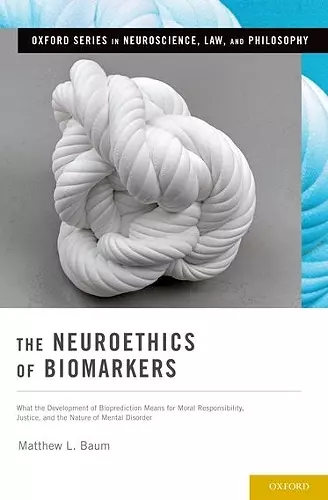The Neuroethics of Biomarkers
What the Development of Bioprediction Means for Moral Responsibility, Justice, and the Nature of Mental Disorder
Format:Hardback
Publisher:Oxford University Press Inc
Published:7th Apr '16
Currently unavailable, and unfortunately no date known when it will be back

Neuroscientists are mining nucleic acids, blood, saliva, and brain images in hopes of uncovering biomarkers that could help estimate risk of brain disorders like psychosis and dementia; though the science of bioprediction is young, its prospects are unearthing controversy about how bioprediction should enter hospitals, courtrooms, or state houses. While medicine, law, and policy have established protocols for how presence of disorders should change what we owe each other or who we blame, they have no stock answers for the probabilities that bioprediction offers. The Neuroethics of Biomarkers observes, however, that for many disorders, what we really care about is not their presence per se, but certain risks that they carry. The current reliance of moral and legal structures on a categorical concept of disorder (sick verses well), therefore, obscures difficult questions about what types and magnitudes of probabilities matter. Baum argues that progress in the neuroethics of biomarkers requires the rejection of the binary concept of disorder in favor of a probabilistic one based on biological variation with risk of harm, which Baum names a "Probability Dysfunction. " This risk-reorientation clarifies practical ethical issues surrounding the definition of mental disorder in the DSM-5 and the nosology of conditions defined by risk of psychosis and dementia. Baum also challenges the principle that the acceptability of bioprediction should depend primarily on whether it is medically useful by arguing that biomarkers can also be morally useful through enabling moral agency, better assessment of legal responsibility, and fairer distributive justice. The Neuroethics of Biomarkers should be of interest to those within neuroethics, medical ethics, and the philosophy of psychiatry.
Our society is only beginning to come to grips with the profound implications of using biomarkers as imperfect 'crystal balls' for predicting the development of neurological and psychiatric disease. Dr. Baum's book is an essential guide to the scientific foundations of these tools and the difficult ethical questions that they raise about moral responsibility and priority setting * Robert D. Truog, Frances Glessner Lee Professor of Medical Ethics, Anaesthesiology, & Pediatrics and Director of the Center for Bioethics, Harvard Medical School *
An exciting and comprehensive look at an important topic. Sure to be of interest to scientists and bioethicists working in the area. * I. Glenn Cohen, Professor of Law and Faculty Director, Petrie-Flom Center for Health Law Policy, Biotechnology & Bioethics, Harvard Law School *
ISBN: 9780190236267
Dimensions: 236mm x 157mm x 20mm
Weight: 499g
224 pages